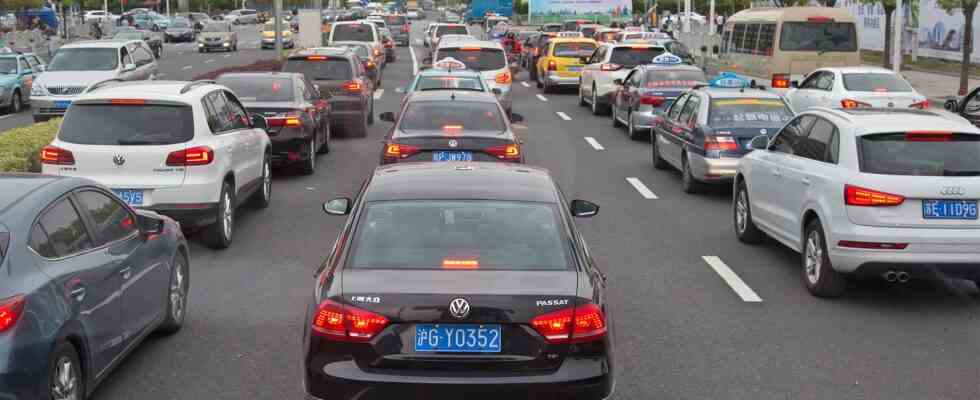background
Status: 07/28/2022 2:56 p.m
China is the most important market for German car manufacturers. VW, Mercedes and BMW sell a good every third vehicle there. However, sales collapsed in the first half of the year. How risky is their addiction?
2022 has been a difficult year for most German automakers so far. Although they were able to earn more money in the first six months, they had to accept a significant drop in sales. BMW sold 13 percent fewer vehicles, Mercedes sold 16 percent fewer cars. VW was hit hardest. The Wolfsburg registered a drop in sales of over 22 percent.
The market is shrinking
This was mainly due to China. Porsche sold 16 percent fewer vehicles there in the first six months. And at Mercedes, sales in the Chinese market fell by around a quarter in the second quarter alone. Because of the corona lockdowns in many metropolises, including Shanghai, the Chinese were reluctant to buy new cars.
The situation should ease up in the second half of the year. However, it is unlikely that the deficit can be made up. The Association of the German Auto Industry VDA expects the Chinese auto market to shrink by two percent this year.
Chinese rivals have caught up strongly
Alarm bells are ringing in the headquarters of VW, Audi, Porsche, Mercedes and BMW. Because China is now their most important sales market. VW sells 37 percent of its vehicles there. At Mercedes and BMW it is about every third vehicle. In the luxury segment, the proportion is even higher: more than two-thirds of all Maybachs are sold in China.
For a long time, German car manufacturers benefited from the China boom. In the 1990s, they still dominated the market in the Asian country. Together with other foreign manufacturers, they had a market share of up to 70 percent. In the meantime, the Chinese rivals have caught up strongly. In the past five years, the market share of German car manufacturers has shrunk from 25 to 17 percent, according to the management consultancy Alix. “The supremacy of the Germans in China is crumbling,” says auto expert Ferdinand Dudenhöffer from the CAR Center Automotive Research.
No German e-car among the “Top Ten”
The expansion of electromobility in the People’s Republic has had a massive impact on German manufacturers. With over 300 models, the competition in China is tough, says Alix director Xing Zhou. While domestic car manufacturers such as BYD (“Build your Dreams”) are rolling up the electric car market, Volkswagen & Co. are struggling with their models. BYD delivered more electric cars in the first half of the year than VW, BMW and Mercedes combined. In the first four months of the year, not a single German brand was among the top ten electric cars in China. VW only ranked 15th.
By 2021, the Wolfsburg-based company had already missed its target of delivering 80,000 to 100,000 vehicles from the new ID electric model series. It is questionable whether the sales of 160,000 to 200,000 electric cars targeted for this year will be achieved. According to the half-year figures published today, VW seems to be on the right track: In June, the group doubled deliveries of electric cars. With 17,600 “electric vehicles” from the ID family, more were sold than ever before in one month in China.
According to a study by management consultancy PwC, German manufacturers are now making up some ground. With new models, they have managed to double their market share for fully electric cars in China to four percent compared to the same period last year. The share of e-cars is currently 15 percent of new registrations in the People’s Republic. Well, every seventh new car in China is a real “electric vehicle”.
Berlin stops guarantees for investments
If German automakers don’t want to lose their most important sales market, they have to invest heavily in electric mobility – and in attractive new models that are tailored to Chinese buyers. But the question increasingly arises as to whether this is politically desirable. The federal government is currently urging the German economy to reduce its dependence on China. For the first time, the federal government recently put a number of guarantees for German companies in China to the test, including for several plant investments by VW.
The Wolfsburg-based carmaker is particularly criticized for its plant in Urumqi, northwest China. According to human rights organizations, the Uyghurs are systematically oppressed and interned in camps in the area. The IG Metall trade union is calling for the location to be given up.
Risky luxury strategy from Mercedes?
Companies from other sectors such as mechanical engineering are now reducing their business in China. The VDMA recommends its member companies to wait and see when investing in new plants in China and rather choose other regions in Asia.
So far, such plans have hardly been heard from German car manufacturers. On the contrary: VW wants to expand its investments in China. And Mercedes consistently trims its brand with the star to luxury like the S-Class and the Maybach. As a result, the Swabians are likely to become even more dependent on China, warns car expert Dudenhöffer. “You have to factor in that risk.”

